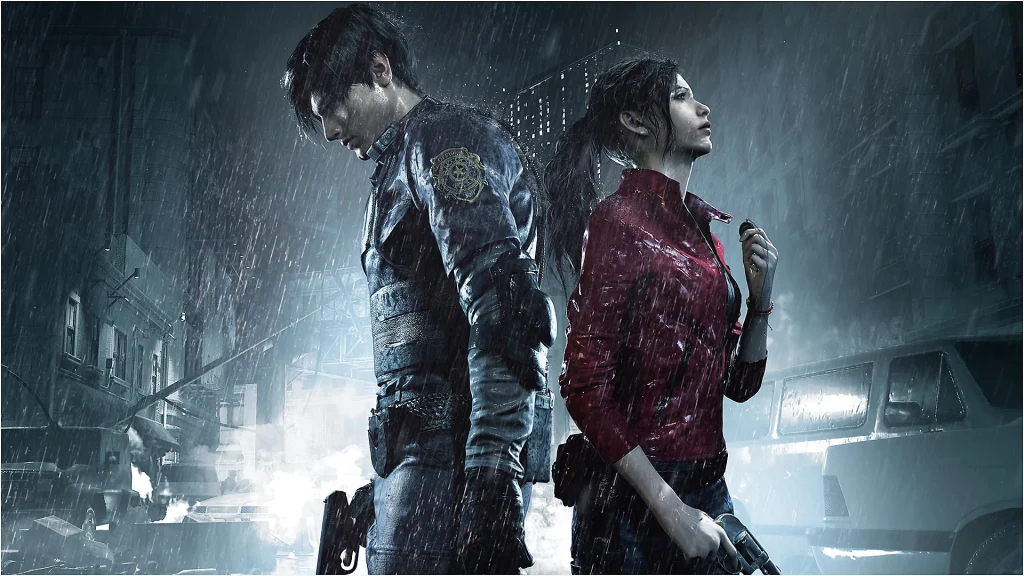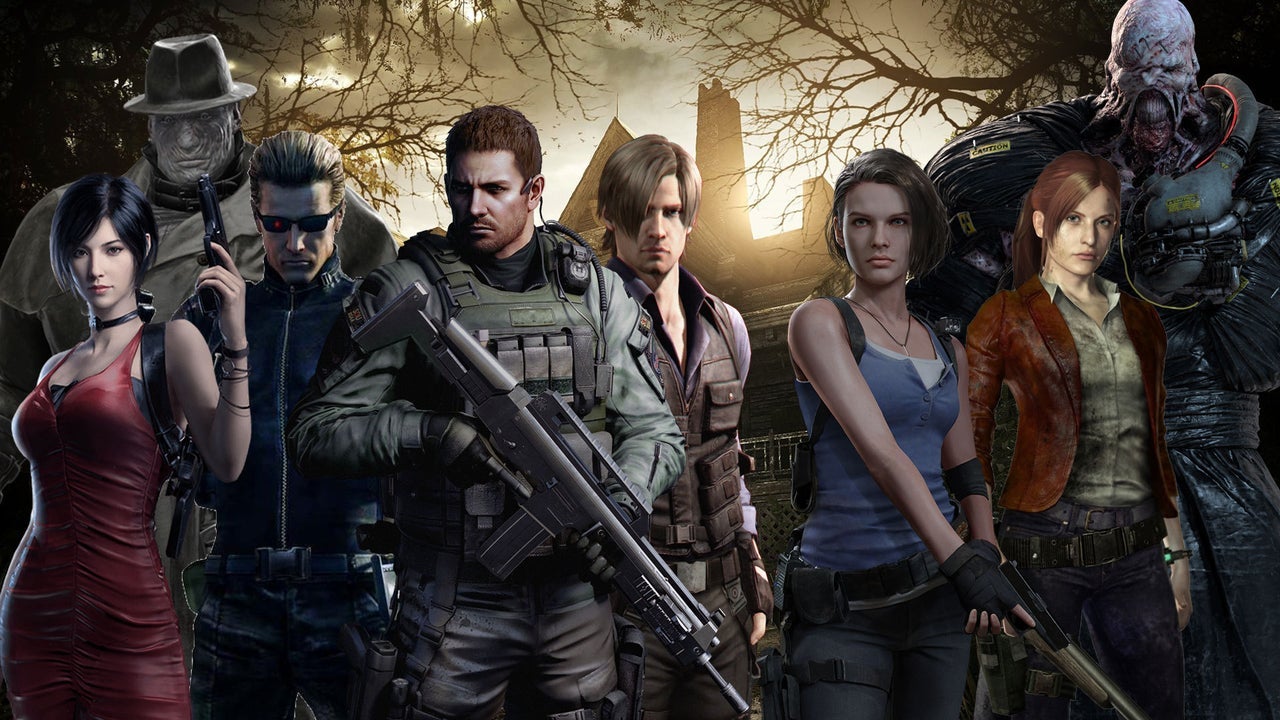The Resident Evil series is one gaming’s most popular installations. Resident Evil games are pretty well the go-to for the survival horror niche and that’s not really questioned. It popularized the the survival horror genre and shaped it into what it is today.
So let us review Resident Evil and break down what’s made it so legendary.
The Series
Resident Evil has a rather confusing timeline in terms of chronological order of release. There’s a bit to unpack here going all the way back to the early 2000s.
- Resident Evil Zero (2002)
- Timeline: Set in 1998, just before the events of the original “Resident Evil.”
- Description: Follows Rebecca Chambers and Billy Coen as they explore a train and a research facility, uncovering the origins of the T-virus outbreak.
- Resident Evil (1996) / Resident Evil Remake (2002)
- Timeline: Directly follows the events of “Zero.”
- Description: Members of the elite S.T.A.R.S. team investigate the disappearance of their colleagues and stumble upon a mansion harboring dark secrets and monstrous experiments.
- Resident Evil 3: Nemesis (1999) / Resident Evil 3 Remake (2020)
- Timeline: Begins before and ends after the events of “Resident Evil 2.”
- Description: Jill Valentine attempts to escape Raccoon City while being hunted by the relentless bioweapon, Nemesis.
- Resident Evil 2 (1998) / Resident Evil 2 Remake (2019)
- Timeline: Concurrent with the events of “Resident Evil 3.”
- Description: Leon Kennedy and Claire Redfield arrive in Raccoon City to find it overrun by zombies, leading them to uncover further Umbrella Corporation conspiracies.
- Resident Evil 4 (2005)
- Timeline: Set in 2004, six years after the destruction of Raccoon City.
- Description: Leon S. Kennedy, now a U.S. agent, is sent to rescue the President’s daughter from a mysterious cult in rural Europe, encountering a new threat – the Las Plagas parasite.
- Resident Evil Revelations (2012)
- Timeline: Set in 2005.
- Description: Focuses on Jill Valentine and Chris Redfield as they confront a bioterrorist organization aboard an abandoned cruise ship.
- Resident Evil 5 (2009)
- Timeline: Set in 2009.
- Description: Chris Redfield, now part of the BSAA, travels to Africa to investigate a new bioterrorism threat and confronts figures from his past.
- Resident Evil Revelations 2 (2015)
- Timeline: Set between “Resident Evil 5” and “6.”
- Description: Follows Claire Redfield and Barry Burton’s daughter, Moira, as they’re kidnapped and taken to a mysterious island.
- Resident Evil 6 (2012)
- Timeline: Set in 2012-2013.
- Description: Features multiple intersecting storylines involving Leon S. Kennedy, Chris Redfield, and new characters, dealing with a worldwide bioterrorist attack.
- Resident Evil 7: Biohazard (2017)
- Timeline: Set in 2017.
- Description: Introduces Ethan Winters, who searches for his missing wife in a derelict plantation in Louisiana, encountering the mysterious Baker family and a new fungal bioweapon.
- Resident Evil Village (2021)
- Timeline: Set in 2021, a few years after “Resident Evil 7.”
- Description: Continues the story of Ethan Winters, who finds himself in a mysterious village filled with mutant creatures and dark figures while searching for his kidnapped daughter.
What’s Resident Evil About?
Villians, monsters, biologica horrors. You fear it, then it’s a concept probably found within the Resident Evil storyline (at least, somewhere).
Known as “Biohazard” in Japan, this survival horror video game series was created by Shinji Mikami and Tokyo Fujiwara and developed by Capcom. The series reflects gameplay uses a combination of horror storylines, puzzles, and action elements as its main frame.
There are many concepts at play in Resident Evil. Here’s a handful:
Core Storyline
The series heavily revolves around an outbreak of viral infections that transforms humans and animals into zombies. Yep, think the Walking Dead or any of your favorite zombie series’ and you’ve likely got roots in Resident Evil.
The dim narrative is supported by what’s known as the Umbrella Corporation, a Pharma and bioweapons company that released the infection. This creates a major theme rooted in corporate conspiracies.
And lastly, we have the obvious element of survival. In Resident Evil, you’ll struggle to survive a world ripe with terrifying creatures, food and ammo shortages, and barely any health resources.
Resident Evil can be downright depressing, but that’s what you sign up for when your into the doom and gloom stuff, right?
The First Game
Released back in 1996, the original Resident Evil was based around Raccoon City and some absurdly wild murders. Police discover a mansion with a secret lab inside of it; and thus, Umbrella Corp is born and forever changes gaming as we know it.
Graphics
Resident Evil graphics vary given the series is two decades old. So the current measuring bar is Resident Evil Village, which was released in 2021.
Creators of the game utilize highly realistic, or photorealistic, environments and characters. And the details in textures is superb. The characters are lifelike while the environments are wildly immersive.
The game’s shadowy lighting injects suspense into all scenes and gives it the signature horror vibe.
Characters in the game, including the protagonist Ethan Winters and the notorious Lady Dimitrescu, are highly detailed, with realistic facial expressions and movements.



The game supports high resolutions, with options for 4K gaming, enhancing the clarity and detail of the visuals.
Resident Evil and Cultural Influence
Resident Evil’s cultural impact, mainly through movies, is unrivaled and has laid the groundwork for video games and their inclusion into mainstream and Hollywood media. But Resident Evil’s influence isn’t just in movies, it spans across comic books, novels, and merchandise.
But yes, it’s the movies that make it such a cultural powerhouse like nothing before it.The “Resident Evil” movie series, separate from the video game franchise, is a collection of science fiction action-horror films loosely based on the games. Translation: the movies stray, at times significantly, from the original game series, but they’re still Resident Evil at heart. Paul W.S. Anderson wrote the now six films.
Resident Evil is an iconic, transformative horror gaming series that pushed gaming into Hollywood’s embrace. Today, Hollywood consistently taps popular games for movies and show scripts.
Resident Evil’s horror vibes remain unmatched in the market.
